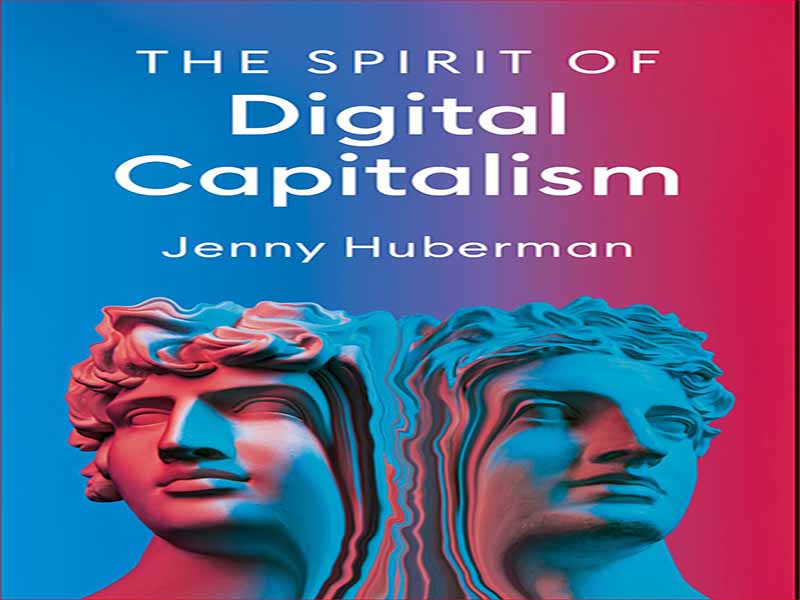- عنوان: The Spirit of Digital Capitalism
- نویسنده: Jenny Huberman
- حوزه: عصر دیجیتال
- سال انتشار: 2022
- تعداد صفحه: 208
- زبان اصلی: انگلیسی
- نوع فایل: pdf
- حجم فایل: 6.45 مگابایت
یکی از چیزهایی که من در مورد دانشمند اجتماعی بودن بیشتر دوست دارم این است که در طول پیگیری یک پروژه تحقیقاتی تقریباً اجتناب ناپذیر است که ایده دیگری مطرح شود. در مورد این کتاب چنین است. ایده این کتاب زمانی مطرح شد که من در حال انجام تحقیقاتی در مورد جنبش فراانسانی در ایالات متحده بودم. فرا انسانگرایان متعهد به استفاده از علم و فناوری برای غلبه بر محدودیتهای بیولوژیکی انسانها و ایجاد یک گونه و جامعه پیشرفته پساانسان هستند. به عنوان آیندهپژوهان و تکنوتوپیستها، فراانسانگرایان این باور راسخ دارند که علم و فناوری را میتوان برای حلشدنیترین مشکلات ما مورد استفاده قرار داد. اما وقتی نوبت به سایر تعهدات ایدئولوژیک می رسد، آنها دچار اختلاف می شوند. برای مثال، برخی فراانسانگرایان بر این باورند که سوسیالیسم دموکراتیک بهترین راه را برای اطمینان از اینکه منافع علم و فناوری بین همه مشترک است، فراهم میکند. در مقابل، بانفوذترین و صریح ترین اعضای جنبش، و کسانی که به عنوان برخی از قدرتمندترین نخبگان فنی سیلیکون ولی ظاهر شده اند، سرمایه داری بازار آزاد را تنها سیستم اقتصادی می دانند که می تواند به طور کارآمد و مؤثر وعده یک رادیکال را تحقق بخشد. آینده بهبود یافته با روحیه «روی میز گذاشتن کارتهایم»، اعتراف خواهم کرد که همدردی من بیشتر با گروه اول است، یعنی تا حدی که به کاوش در امکانات سوسیالیسم دموکراتیک علاقه مندم تا راه اندازی یک راه جدید و جدید. گونه های پس از انسان افزایش یافته است. اما این گروه اخیر از فراانسان گرایان، کسانی که به وعده سرمایه داری پایبند بودند، بودند که مرا به سمت پرسش هایی که در این کتاب بررسی می کنم هدایت کردند. با وجود شواهد فزاینده مبنی بر اینکه نابرابری و رنج اقتصادی به سرعت در حال افزایش است، راههایی را که فراانسانیها دفاع میکنند و ایمان خود را به نظام بازار آزاد ترویج میکنند، دنبال کردم، شروع به این سوال کردم که توجیهات غالبی که برای حمایت و حفظ سرمایه مورد استفاده قرار میگیرد چیست. انباشت در عصر تکنولوژی کنونی؟1 برای کسانی که ثروت خود را با سرمایه گذاری در فناوری های جدید به دست آورده اند، و برای کسانی که فناوری های جدید را به امید افزایش سود شرکت ها به کار می گیرند، از چه ایده ها و بازنمایی هایی برای به تصویر کشیدن سرمایه داری به عنوان “تنها” استفاده می کنند. ممکن است» یا حتی «بهترین از همه ممکن» دستورات اقتصادی؟ با در نظر گرفتن این سؤالات به عنوان نقطه عزیمت، در این کتاب من دو رویکرد را برای مطالعه سرمایه داری معاصر با هدف در نهایت نشان دادن چگونگی نفوذ زندگی اجتماعی در عصر دیجیتال توسط مجموعه ای بدیع از تضادهای فرهنگی ترکیب می کنم. از یک طرف، من بررسی میکنم که چگونه فناوریهای دیجیتال شکلهای جدیدی از انباشت، استخراج و تسلط سرمایه را ممکن میسازند. از سوی دیگر، من شکلبندیهای ایدئولوژیکی را بررسی میکنم که برای توجیه دسیسههای سرمایهداری دیجیتال استفاده میشوند. همانطور که مردم شناسان و جامعه شناسان مدت هاست مشاهده کرده اند، بازتولید سرمایه داری هرگز صرفاً یک امر اقتصادی یا تکنولوژیکی نیست: بازتولید سرمایه داری مستلزم مجموعه ای از باورها است که مشارکت کنندگان آن را قادر می سازد مشارکت خود را در «نظام» توجیه و مشروعیت بخشند. و با این حال معانی و ایدههایی که انباشت سرمایه را حفظ میکنند، که توجیهی برای گردش مداوم M‒C‒Mʹ به عنوان منطق سازماندهنده اقتصاد سرمایهداری فراهم میکنند، میتوانند به طور قابل توجهی در زمانها و مکانهای مختلف متفاوت باشند. ترکیب فنآوری سرمایه تغییر میکند، «روح» آن نیز تغییر میکند. این کتاب به دنبال کشف روح سرمایه داری دیجیتال است که توسط متخصصان کسب و کار، کارآفرینان، سرمایه داران خطرپذیر و بشردوستانه در ایالات متحده معاصر توسعه و به کار گرفته می شود. اشکال جدید انباشت سرمایه، استخراج و سلطه. من استدلال میکنم که این کار را نه تنها با ارزشگذاری روح رقابت، همانطور که مدتها در گذشته سرمایهداری انجام میداد، یا با تمجید از نقشی که سرمایهداری در حفاظت از آزادی و دموکراسی بازی میکند، یکی دیگر از «ترفندهای» قدیمی سرمایهدار انجام نمیدهد. “کتاب بازی.” روح سرمایه داری دیجیتال علاوه بر تکیه بر هر دوی این «حرکات» ایدئولوژیک طولانی مدت و به خوبی بررسی شده، ادعاهای جدیدی در مورد روشی که فناوری های دیجیتال به خیر عمومی کمک می کند، تقویت همکاری و اتصال، و راحت تر کردن زندگی مطرح می کند. حتی اگر این راحتی به قیمت ارزشهایی مانند حریم خصوصی و آزادی تمام شود. بنابراین بحث اصلی این کتاب این است که روح سرمایه داری دیجیتال واقعاً با ژانوس مواجه است و مجموعه جدیدی از تضادهای فرهنگی را در قلب جامعه معاصر آمریکا آشکار می کند.
One of the things I love most about being a social scientist is that in the course of pursuing one research project it is almost inevitable that the idea for another one will arise. Such is the case with this book. The idea for this book emerged as I was conducting research on the transhumanist movement in the United States. Transhumanists are committed to using science and technology to overcome the biological limitations of human beings and usher in an enhanced posthuman species and society. As futurists and techno-utopians, transhumanists share a firm belief that science and technology can be used to solve our most intractable problems. But when it comes to other ideological commitments, they are divided. Some transhumanists, for instance, believe democratic socialism provides the best way to ensure that the benefits of science and technology will be shared by all. By contrast, the most influential and outspoken members of the movement, and those who have emerged as some of Silicon Valley’s most powerful techno-elites, proclaim free-market capitalism is the only economic system that can efficiently and effectively realize the promise of a radically enhanced future. In the spirit of “laying my cards on the table,” I will confess that my sympathies lie more with the first group, that is, to the extent that I am interested in exploring the possibilities of democratic socialism rather than ushering in a new and enhanced posthuman species. But it was this latter group of transhumanists, those devoted to the promise of capitalism, which led me towards the questions I examine in this book. As I traced the ways transhumanists defend and promote their faith in the free-market system, despite mounting evidence that inequality and economic suffering are rapidly on the rise, I began to ask myself what are the dominant justifications that are used to support and sustain capital accumulation in the current technological age?1 For those who have made their fortunes by investing in new technologies, and for those who deploy new technologies with the hopes of enhancing corporate profits, what ideas and representations do they use to portray capitalism as the “only possible” or even “best of all possible” economic orders?
Taking these questions as a departure point, in this book I synthesize two approaches to the study of contemporary capitalism with the aim of ultimately demonstrating how social life in the digital age is permeated by a novel set of cultural contradictions. On the one hand, I explore how digital technologies are making possible new forms of capital accumulation, extraction, and domination. On the other hand, I examine the ideological formations that are used to justify the machinations of digital capitalism. As anthropologists and sociologists have long observed, the reproduction of capitalism is never just an economic or technological affair: the reproduction of capitalism requires and gives rise to sets of beliefs that enable its participants to justify and legitimate their participation in “the system.” And yet the meanings and ideas that sustain the accumulation of capital, that provide justification for the ongoing circulation of M‒C‒Mʹ as the organizing logic of the capitalist economy, can vary quite considerably across different times and places.2 As the social and technological composition of capital changes, so too does its “spirit.”
This book seeks to explore the spirit of digital capitalism as it is being developed and deployed by business gurus, entrepreneurs, venture capitalists and philanthropists in the contemporary United States.3 In the pages that follow, I demonstrate how the spirit of digital capitalism justifies and legitimates new forms of capital accumulation, extraction, and domination. I argue that it does this not just by valorizing the spirit of competition, as has long been the case in the capitalist past, or by extolling the role that capitalism plays in the protection of freedom and democracy, another old “trick” from the capitalist “playbook.” In addition to drawing upon both of these long-standing and well-examined ideological “moves,” the spirit of digital capitalism makes new claims about the way digital technologies contribute to the common good, foster collaboration and connectivity, and render life more convenient, even if this convenience comes at the expense of once cherished values such as privacy and liberty. Thus the central argument of this book is that the spirit of digital capitalism is indeed Janus-faced, and it reveals a new set of cultural contradictions at the heart of contemporary American society.
این کتاب را میتوانید بصورت رایگان از لینک زیر دانلود نمایید.
Download: The Spirit of Digital Capitalism


































نظرات کاربران